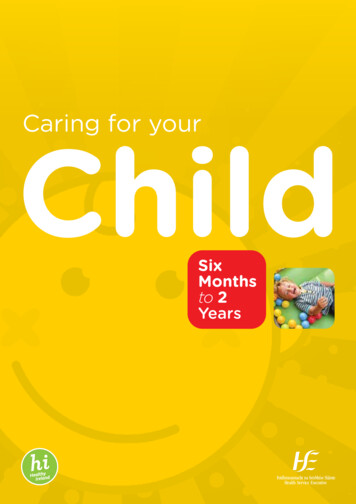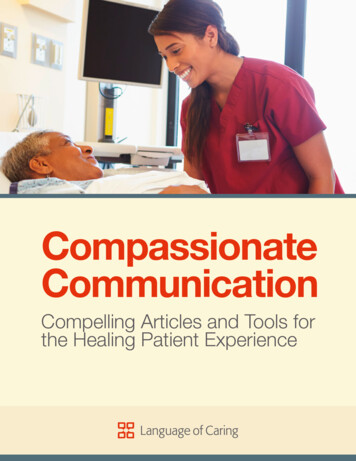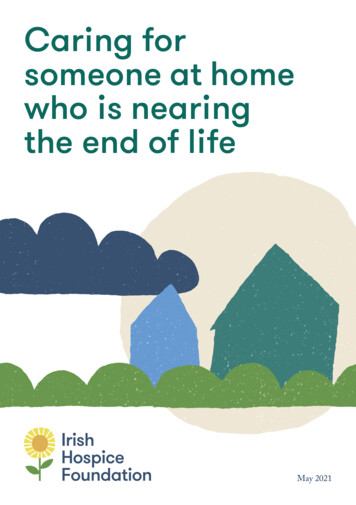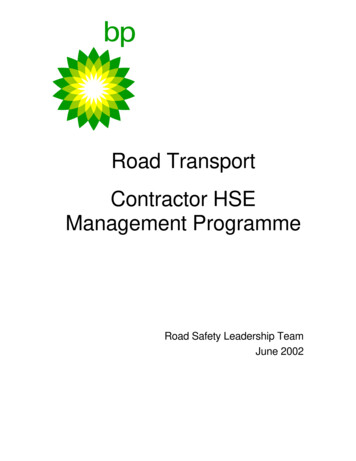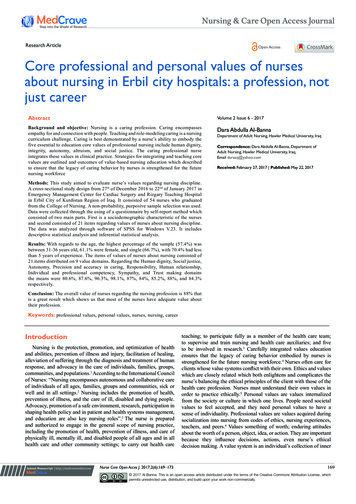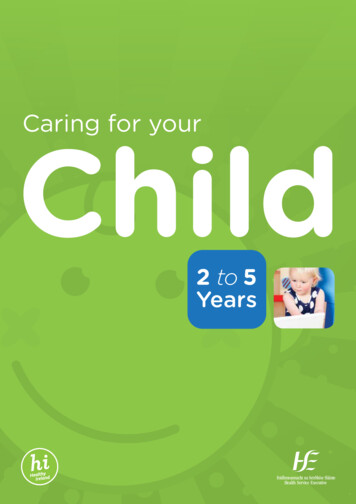
Transcription
ChildCaring for your2 to 5Years
ContentsIntroductionPage31 Taking care of yourself as a parent 4For mams and dads - being a goodenough parent4Getting extra support for parents5Parenting courses6Planning a short break away from your child 8For couples who are separating or divorcing 8For parents who live apart102 Feeding your child2 to 5YearsYour Public Health Nurse:Your Health Centre:12BreastfeedingCommon questions about food and childrenOverweight and obese childrenHelping your child stay activeCaring for your child’s teeth12161819203 Sleeping24Where should my child usually sleep?How much sleep does my child need?Managing sleep problems2424264 Caring for your child every dayWashing your childDressing your childToilet training your childNight time bedwetting in older childrenLifting and carrying your childPreparing your child for hospitalImmunisationCommon childhood illness282828303334353637Page5 A guide to your child’s growthand developmentYour child’s development - posture andmovementYour child’s growth and weight gainYour child’s eyesightYour child’s hearingYour child’s speech and languagedevelopmentYour child’s social, emotional andbehavioural developmentYour child’s sexual developmentHealth checks for your childYour child with special needsDevelopmental disorders64040424345464957606262Playing, being active and learningHow does play help my child grow anddevelopDeveloping through playPlaying with toys and household items687 Keeping your child safe74Fire safety in the homeTravelling in the car with your childTeaching safety without scaring your child7576778 Early education and careWhat is a parent and toddler group?Pre-school servicesPreparing your child for primary school9 Your benefits & leaveentitlements10 Useful web pages &phone numbers687072787879838892
ForewordThis information pack is the third in a set of threepacks for parents: Caring for Your Baby: Birth to Six Months Caring for Your Child: Six Months to Two Years Caring for Your Child: Two to Five YearsEach one contains information to help you to carefor yourself and your child during your child’s firstfive years. Before we produced this informationpack, we asked parents what information theyneeded to care for themselves and their baby ortoddler during this time. Parents said they wantedcommon-sense information and tips on the generalcare of their child; information about the growthand development of their child; advice about whatto do if their child has a problem; and details ofwhat people and services to get in touch with formore help and support.IntroductionThe information in this pack is based on the mostup-to-date, accurate information available within theHealth Services, and on opinion from professionalsin child health, support services, voluntaryorganisations and parent groups.Each baby is special and for some of you, thedetails in this pack are only the beginning of yoursearch for information on how to do the best foryour baby and you. No booklet is a replacement fortalking with someone who is trained to help you, sothe useful web pages and phone numbers at theend of the pack will help you reach a wide range oftrained professionals.Welcome to Caring for Your Child: 2 to 5 years.This booklet contains valuable information to help you care for yourself and your childover the next three years.Caring for your child is exciting, challenging and a big responsibility. Parenting stylesmay vary but as a parent your goal is the same as other parents’ goal. You want to dothe best you can for your child.Good quality information is one of the key elements that will guide you in doing a goodjob. This booklet will help you deal with the everyday concerns of being a parent. It willalso point you to people and services that offer further information and support.Sincere thanks to all the health professionals whohelped in the development of this child healthinformation pack, especially the parents.Baby ChildCaring for yourCaring for yourSixMonthsto 2YearsFor copies, contact your Public Health Nurse or see www.hse.ie/caringforyourbabyFirst publishedOctober 2005Reviewed2009Updated20153
1 T1. aking care of yourselfas a parentFor Mams and Dads being a ‘good enough’ parentIt is important to realise that you do not have to be perfect as a parent. Everybody makesmistakes. You are already juggling many roles in your daily life, and it’s hard to be an expertat everything. What is more important is to be good enough in doing the best you can foryour child, yourself and your family.What matters most to your child is that you are there to love and care for them. Your childwants to be able to come to you when they need your support and cuddles. Where it ispossible, it is important that dads be as active in caring for their child as mams.Caring for yourselvesGetting extra support for parentsHigh-quality childcare, information, parenting programmes and early intervention can greatlyhelp you as a parent. These things will also help your child, family and community.Caring for your baby: Six Months to Two Years Old discusses the extra supportoffered by: Public health nurses The Child and Family Agency provides support to families through their Family ResourceCentres see www.tusla.ie or call 01 635 2854 Barnardos; www.barnardos.ie Social work departments. www.tusla.ie If you do not have a copy seewww.hse.ie/caringforyourbaby Support your partner when they are dealing with your child’s misbehaviour Work as a team by sharing your roles as parents Talk to each other every day about your children and family Praise and encourage each other when things go well Don’t be afraid to ask for help. All parents need help at different stages Child psychology Discuss any problems with your partner when you are both calm Parenting programmes Don’t discuss problems in front of your child Community welfare officers Set a good example in your own behaviour so that your child will see it and copy you Citizens Information CentresOther examples of the range of supports available toparents include:Smoking and drinking alcoholIf you want to give up smoking help and support is available onwww.quit.ie or talk to your doctor.It’s a good idea to keep an eye on your drinking habits.Do you know what a standard drink is? Do you knowyour limits? Find out more at www.yourdrinking.ie4A child psychologist is a health professional who has specialist training. They canassess your child and provide therapy services for children and families in need ofsupport. A psychologist can help with: Behaviour problems: If your child has behaviour problems, the psychologist can helpyou learn how to manage them Family difficulties: A psychologist can help your child cope if you and your partnerseparate; if a close family member or friend dies; if there is violence in the home;or with difficult family relationships5
Abuse: A psychologist can help a child who has experienced sexual, physical oremotional abuse or neglect. They can also support the parents of the child who wasabusedFor more information on parenting courses in your local area, contact: Your local public health nurse The child and family psychology department The health promotion department Emotional difficulties: A psychologist can help you manage anxiety, stress and selfesteem issues in children Health-related difficulties: If your child has a chronic illness or long-term disability,a psychologist can help them develop coping skills The county childcare committee Your local school parent councilSupport for children in residential care: If your child is in residential care, a childpsychology service provides support for them Your local family resource centre Community mothers The Citizens information centre Your family doctor You can also look up the websites in section 10 of this booklet for more informationon parenting courses Intellectual disability (special needs): There is a child psychology service toprovide support to children who have a moderate or severe intellectual disability, autismor learning difficultiesYour health professional can refer you on to your local child psychology department.There may also be a ‘drop in’ clinic in your area. For more details contact your publichealth nurse.Parenting coursesFor some of you, parenting courses or classes are not high on your list of things to do.You have a very busy time juggling family and work commitments. But most parents of olderchildren and teenagers say they wish they had gone to parenting classes when their childwas a toddler or pre-school child. Other parents who did go to parentingcourses say they learned lots that helped them to be a parent.Parenting courses offer information and support on: Parenting skills and coping Dealing with adult, child and family relationships Managing your child’s behaviour The general care of your young child The benefits of play in your own child’s growth and developmentWe recommend you do a high-quality parenting support course at different stages of yourchild’s growth and development. The practical tips and advice you get will help you do thebest you can for your child.67
Planning a short break away fromyour childSometimes you or your partner may want or have to spend time away from your child.It might be due to work, to enjoy some time with your partner or personal time alone.It is important that you prepare well before you go so your child’s routine is not disturbedtoo much. Then you can enjoy the break and your child will cope without you for a shortwhile. The tips below will help you prepare your child for this short break. Make sure a responsible adult looks after your child while you are gone Discuss your child’s routine with the person who will care for your child. Includeinformation on your child’s favourite food, their favourite bedtime story and their toilettraining routine If possible, don’t divide your children between different homes when you go away.They may already feel upset about being separated from you. They will get comfortfrom each other while you are goneHow can I help my child through a separationor divorce? Love, support and reassure your child Explain why you are separating or divorcing. Reassure your child that it is not their fault To reassure your child, both parents need to give the same explanation in a way that isright for your child’s age Tell your child that they can still love both parents. They don’t have to take sides Tell your child that it’s ok to talk about their feelings, worries or anger Listen to your child’s feelings and the reasons they are angry or sad. Sit down with them soit is easy to make eye contact. Eye contact lets them know that you are listening to them Use simple words of encouragement to help them talk to you. For example, say,“It seems like something is troubling you. Can I help?” Encourage your child to spend time with their friends doing normal things like playing Let your child know you are going away two or three days before you go. Then theyhave time to ask questions and prepare themselves Respect your child, tell them about the process and involve them in decisions as muchas you can Reassure your child that you will be coming back soon Keep in touch with your child by phoneDo not speak badly about your partner and why you are separating, despite how you mayfeel. Your child may feel guilty about loving their other parent while they try to be loyal to you Reassure your child that they will still have contact with the parent who leaves the homeFor couples who are separatingor divorcingSeparation or divorce is a time of unhappiness and stress for a family. It is difficultenough to cope with your own emotional needs at this time. When you have children it isimportant to look after their emotional needs too.How can I care for myself during a separationor divorce? Get support and help from others, such as family and friends Look after yourself. Eat, sleep, rest and take exercise Keep telling yourself that this upsetting time will pass Be positive about your future. Make realistic plans for yourself and your children Contact support networks such as The Child and Family Agency, which offers familymediation and counselling services. These services help to ease your stress and fearsand have a positive impact on your child. www.tulsa.ie8If you feel that your emotional difficulties or your child’s difficulties are serious, there areprofessionals who can help you. You can contact your community resource centre, wherea range of support services are available;- the Citizens Information Centre; 0761 07 4000 www.citizensinformation.ie- Women’s refuge centres; freefone 1800 341 900www.womensaid.ie- the Money Advice and Budgeting ServiceMABS - 0761 07 2000 MABS; www.mabs.ie- your doctor- your public health nurse- the child, adolescent and familypsychology department- the social work departmentwww.tusla.ie9
For parents who live apartMy partner and I live apart. How can I make sharedparenting easier for my child? Dads and mams play a very important role in their child’s life, whether they are in arelationship or not In most cases, it is important for your child to have contact with both parents. Sharedparenting lets your child build a positive, loving relationship with both parents. Your childwill also develop a good sense of their own identity Sometimes it is not physically possible to share the parenting responsibilities for yourchild. Keep in contact through phone calls or online Send copies of your child’s pre-school and school reports to the other parent so theyare aware of the progress their child is making. Knowing about pre-school progress andschool reports shows your child that both their parents love and care for them Let the other parent know about pre-school or school plays, parent and teacher meetingsor other events that parents are expected to attend. It is important for your child that bothparents see them in plays and other activities, if that is possible Your child needs to feel at home in both parents homes. Your child needs both families tolove and accept them. Simple things can help. Let your child have a place for their owntoothbrush, special blanket and toys. This is a sign that they belong and are not merelypassing through It is important to realise that you need to separate your relationship with your child fromyour relationship, or the lack of one, with your child’s other parent1011
2.2 Feeding your childThe information pack Caring for Your Child: Six Months to Two Years Olddiscusses:A healthy balanced diet for your childHealthy eating is about enjoying lots of different healthy foods from the four main foodgroups. There are four main food groups: Breastfeeding Formula feeding Starting to spoon-feed your childStarchy foods: A healthy, balanced diet for your childThese are the energy foods. Offer at each meal and also as snacks Common questions about food and children Caring for your child’s teethBread, bagel, bread roll, crackers, pitta bread, wraps, rice cakes, scones, porridge, wheatbiscuits, flake-type cereal; potatoes, pasta, plain noodles, couscous, rice.If you do not have a copy of the second informationpack see www.hse.ie/caringforyourbabyBreastfeedingIf you are continuing to breastfeed your child, information and support is available throughyour local: Public health nurse Health promotion department La Leche League breast feeding support groupwww.lalecheleagueireland.com Cuidiu breastfeeding support group. www.cuidiu-ict.ieRead our booklet Breastfeeding a Good Start in Life in thepublications section on www.healthpromotion.ieFruit and vegetablesProvide lots of vitamins and minerals. Offer at each meal and also as snacks.Fruit-Apple, avocado, banana, mandarin oranges, grapes, blackberries, blueberries,raspberries, strawberries, kiwifruit, plum, apricot, mango, melon, orange, peach, nectarine,pear, pineapple, stewed fruit, tinned fruit, fruit puree.Vegetables-Beetroot, broccoli, cauliflower, brussels sprouts, cabbage, carrot, celery,cucumber, peppers, lettuce, cherry tomatoes, courgettes, aubergine, leeks, onions, shallots,mange tout, mushrooms, parsnip, peas, spring greens, spinach (cooked), turnip, sweetcorn,tomato, homemade vegetable soup.If your child does not each much fruit, encourage them to eat more vegetables.Dried fruit should be limited to mealtimes and only once a day as they are not kind to teeth.Fruit juices are not necessary, but if you choose to give them to your child they should bewell diluted and given only with meals.Milk, yogurt and cheeseProvide calcium for healthy bones and teeth. Offer with each meal or as a snackMilk (no more than 600ml a day), yogurt, fromage frais, cheese, custard, milk puddingFollow-on or special toddler milks should not be necessary. Nutritious foods are moreappropriate sources of extra nutrients. You can gradually introduce low fat milk after 2 yearsof age provided your child is a good eater and has a varied diet. Skimmed milk is not suitablefor children under 5 years.1213
Meat, fish, eggs, nuts, beans, lentils, tofuProvide protein for growth and development. Offer twice a day.Meat, chicken, turkey, fish, eggs, baked or kidney beans, chickpeas/hummus, lentils, tofu,nuts or peanut butter.Children should avoid whole nuts until at least 5 years of age because of the danger of choking.How can I encourage my child to have a healthybalanced diet? Encourageyour child to eat a variety of foods. Your child’s diet will be more balancedwhen a wide range of different foods are eaten Encourageyour child to eat 5 portions of fresh or frozen fruit and vegetables daily. Fruitand vegetables contain lots of vitamin A, C and E.Chicken nuggets, sausages, fish fingers and burgers are often lower in protein and higher infat than unprocessed meats or fish. They should not be a regular part of your child’s diet. ActiveFats, oils, spreads TryVery small amounts of these are needed to add flavour and enjoyment. However they arehigh in energy or salt so should be used sparingly or use a teaspoon to measure out. ForFoods and drinks high in fat, sugar or salt.young children need healthy snacks between main meals. Make sure the snacksyou give your child are nutritiousto eat in a relaxed area without the TV turned on, as children can be easily distractedfrom eatingyounger children, start with smaller portions of food and increase according to yourchild’s growth and appetite. Do not try to over feed themSweets, chocolate, biscuits, cakes, fizzy drinks or crisps should not be part of your child’sdaily diet. Filling up on foods from this group spoils your child’s appetite for more nutritiousfood. Sugary food and drinks are not good for your child’s teeth. Never use foods high in fat,sugar or salt as a reward or to comfort your child. ChildrenHealthy snack options include fresh fruit, vegetables, plain yogurt, cheese and bread. Milkand water are the most tooth-friendly drinks. A maximum of 600ml of milk a day should begiven. Remember, from 12 months of age, only a cup or non-lidded beaker should be usedfor all drinks other than breastfeeds. HaveVitamin D is important for good bone health but it is difficult to get enough from foods.Oily fish like herring, mackerel, salmon, trout, sardines or eggs naturallyhave good amounts of vitamin D. Other foods have vitamin Dadded like particular breakfast cereals (called ‘fortified’cereals) or some milks. These should beincluded regularly in your child’s diet, forexample give oily fish once or twice a week.know what foods they like and are usually wary of new foods. Introduce newfoods one at a time. If your child doesn’t want something, don’t push it on them. Try itagain a few days later. A food may be refused several times before being eaten Letyour child help you prepare food. This may encourage them to eat what they madeyour child’s friend over for a meal. It may encourage your child to eat their food orto try new food Cutdown on foods that have a lot of saturated fats, such as cakes or biscuits. Do notadd sugar or salt to foods Donot keep unhealthy snack foods such as biscuits and sweets in your house. If theyaren’t there, you and your child won’t be tempted to eat them Donot ban any foods outright, such as ice cream and sweets. You may make thesefoods even more appealing to your child Ifyour child eats sugary foods at their friend’s birthday party, don’t make a fuss over it.It’s just a party treatIf you are worried about your child’s weight or eating habits, contact your health professionalfor advice. For healthy eating recipes see www.safefood.eu1415
Common questions about foodand childrenWhat foods do I give my child if they arevegetarian?Why doesn’t my child sit down and eat atmealtimes?Make sure that your child gets a healthy balanced diet for their growing mind and body.Your child needs: Pulses, such as peas, lentils and beansThe information pack Caring for Your Child: Six Months to Two Years Old discussed thetopics: Milk and milk products, such as yoghurt and cheese Eggs Soya foods Quorn, which is a source of protein that can be used instead of meat What are fussy, faddy and picky eating habits? What can cause fussy eating? What can I do to encourage my child to eat well?Read section 2 of that information pack again to review those tips.Other reasons why your child may be makingthe mealtime hard to manage.Other than that, your child’s diet is the same as any other growing toddler and pre-schoolchild. But as it may be more difficult for your child to meet their nutritional requirements ona vegetarian diet, it would be useful to get more advice from your community dietitian.What is a food allergy? Your child may find it hard to sit down quietly for long periods, especially if mealtime islong. Be realistic in how long your child to sit quietlyA food allergy is an immune reaction in your child’s body to a food after eating it.Only tests that your family doctor or hospitals do can tell you if your child is allergic to a food. Your child may like some foods more than others. Their favourite food may not be on themenu today, so they lose interest in the meal If you suspect your child has a food allergy, go to your family doctor to have it medicallydiagnosed. Your family doctor may also refer you to a dietitian for specialised advice Your child’s appetite can vary from day to day. We all have days when we are not thathungry Do not try to give your child various foods yourself to see what works. Limiting yourchild’s diet can malnourish them. Ask a professional for advice Children often get extra attention when they do not eat or sit down during mealtime.Your child might realise that their behaviour attracts your attention, so they may repeatit. Instead of coaxing your child to eat or getting cross with them, praise their goodbehaviour. For example, say something like, “Andrea, you sat through the whole mealtonight. Well done, I like it when you sit nice and quietly with us.”For more information on allergies see www.ifan.ie As your child grows and learns good eating habits, they will not act up and behave badly.Continue to praise your child for eating and behaving well at mealtimesFor more tips on dealing with your child’s behaviour, go to section 5 of this booklet.1617
Overweight and obese childrenWhat do the terms ‘overweight’ and ‘obese’ mean?Overweight means that your child weighs more than they should for their height.Obese means that your child has such an excess of body fat that it may cause them serioushealth problems.If my child is overweight or obese, what are therisks to their health? What can I do if I think my child is overweightor obese?Check your child’s weight against the growth (centile) chart on their Personal HealthRecord where this record book is available. You will be able to compare your child’s weightto the average for their weight and height. If your child appears to be gaining weight much faster than they should, they may beoverweight or obese. Make changes as a family towards living a healthier lifestyle. Thiswill benefit everyone’s health and focus on health rather than on body weight or shape.Remember your actions may affect your child’s future attitudes to food, their body,andtheir self-esteem. What is important is that you work together and support and love yourchild, whatever they look like Get advice from your local public health nurse, communitydietitian, doctor or practice nurse on how to care foryour childBeing overweight or obese can cause health problems for your child in later life.Possible problems include: Diabetes High blood pressure High cholesterol Stroke Heart disease Arthritis Poor self-esteemFor more information read the leaflet ‘Your Child’s Weight –‘A guide to Preventing Childhood Obesity’ available in thepublications section on www.healthpromotion.ieWhich children have an increased risk of beingoverweight or obese? Babies who grow very fast in infancy because of overfeeding Children who have parents who are overweight or obese Children who eat lots of food that is high in sugar, fat and salt Children who drink fizzy drinks Children who watch lots of TV and don’t exerciseWhat can I do to reduce the risk of my childbecoming overweight or obese? Encourage your child and your family to be active. For example, walk with your childrather than use the car or bus if you canBreastfeed your baby if you can. Breastfeeding reduces the risk of obesity laterin childhood Have regular mealtimes where all your family sit down to eat a healthy balanced meal together Do not give your child fizzy drinks. Offer water or milk instead Set your child a good example. Only eat healthy snacks between meals and don’t eatsugary foods Limit the amount of time your child spends watching TV to one or two programmes a day18Read the Fact Sheets on www.indi.ieThe good food choices you make for your child today will affect theirhealth in the future.Helping your child stay activeStaying fit and healthy is important for your child’s normal growth and development. It alsohelps you and your family keep well. Physical exercise and a healthy balanced diet withenough sleep are all part of staying fit and healthy. A healthy balanced diet and an activelifestyle will: Reduce the risks, listed on page 18, of becoming overweight or obese Build strong bones and teeth Reduce stress and tension by allowing your child toburn off energy Give your child more opportunities to learn anddevelop their brainFor more information read the leaflet ‘Eat Smart Move More’ in thepublications section of www.healthpromotion.ie It contains usefultips on portion control, types of activities and a meal planner.19
How can I provide an active lifestyle for my childand myself?For useful ideas on toys, fun games and activities that help provide an active lifestyle foryour child and family, go to section 6, ‘Playing, being active and learning’. Check out theevents section of www.getirelandactive.ie for sports in your area.Caring for your child’s teethThe information pack Caring for Your Child: Six Months toTwo Years Old looks at the topics below: How many teeth will my child have? How do my child’s teeth grow? Why are baby teeth important? What is tooth decay? How can I care for my child’s teeth? How do I clean my child’s teeth and gums? Injuries to baby teethRead ‘Caring for Your Child: Six Months to Two Years’ at www.hse.ie/caringforyourbaby.When will all my child’s first (baby) teeth be there?Your child should have most of their 20 baby teeth by the time they are 2½ years old.He/She will be 12 years old or more before the last baby tooth falls out.When will my child start to get their adult(permanent teeth)?At around 5-6 years of age, your child’s baby teeth will begin to fall out and be replaced bypermanent teeth. The front baby teeth, at the bottom of the mouth are usually the first tofall out. At around the same time, the first adult back teeth (molars) start to come throughthe gum right at the back of the mouth. Because no baby teeth will fall out to make way forthese new back teeth, it is very important to look out for signs of these new molar teeth.What is tooth decay?Tooth decay takes place when sugary foods and drinksare broken down by bacteria in the mouth to formacids which destroy the tooth surfaces. It is the mostcommon ongoing childhood disease. It can be difficultto treat in young children.20Can tooth decay be prevented and how can I do it?Tooth decay can be prevented. Teeth are at risk of decay as soon as they appear in themouth. Food and drinks that contain sugar can cause decay. Controlling how often yourchild has sugary foods and drinks is really important to prevent decay. Remember that ababy is not born with a sweet tooth so don’t give them one. Delay giving your child sugaryfood and drinks for as long as possible.How can I keep my child’s teeth healthy? Encourage your child to eat a balanced diet with plenty of fruit, vegetables and fibre Foods and drinks that contain sugar can lead to tooth decay. Keep foods and drinks thatcontain sugar to mealtimes only. Do not give sugary foods as snacks between meals Milk and water are the most tooth-friendly drinks. They are good drinks to give your childwith or between meals. Keep fruit juice or squash to meal times only and dilute well Fruit juices are not needed. Try to give cooled boiled water only until your child is 1 yearold. If you choose to offer juices, only small amounts of well-diluted, unsweetened fruitjuice (dilute 1 measure pure fruit juice to 8-10 measures cooled boiled water) should begiven from a beaker only at mealtimes or with snacks and only from 1 year onwards. Avoid fizzy drinks. They contain a lot of sugar and acid. If your child does drink a fizzydrink, use a straw. It helps keep the fluid away from their teeth Read food labels carefully. Sugar may also be called sucrose, fructose, glucose ormaltose on labels. ‘Low sugar’ or ‘no added sugar’ on the label does not mean that thefood or drink is sugar-free Sugar-f
Each one contains information to help you to care for yourself and your child during your child’s first five years. Before we produced this information pack, we asked parents what information they needed to care for themselves and their baby or toddler during this time. Parents said they wanted common-
